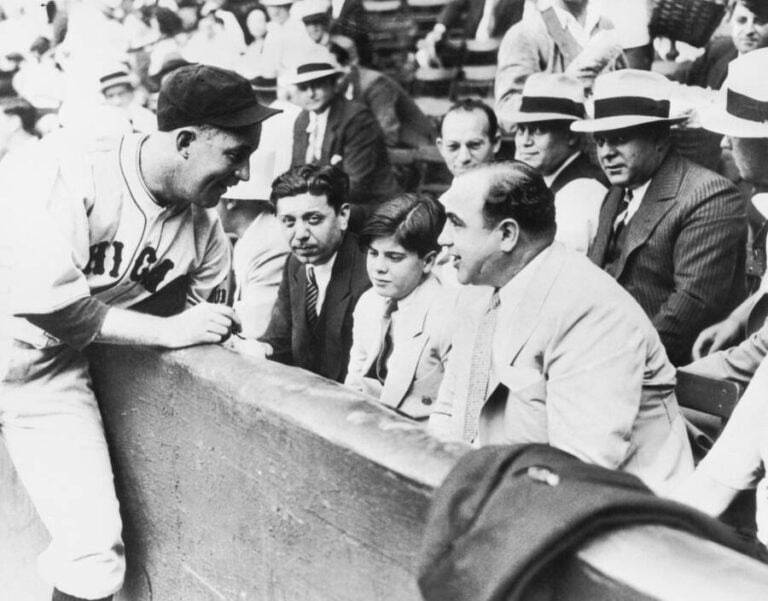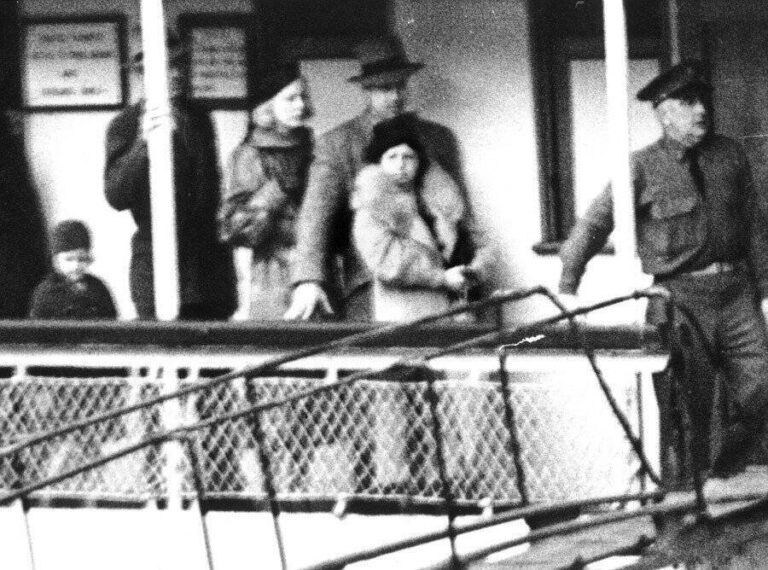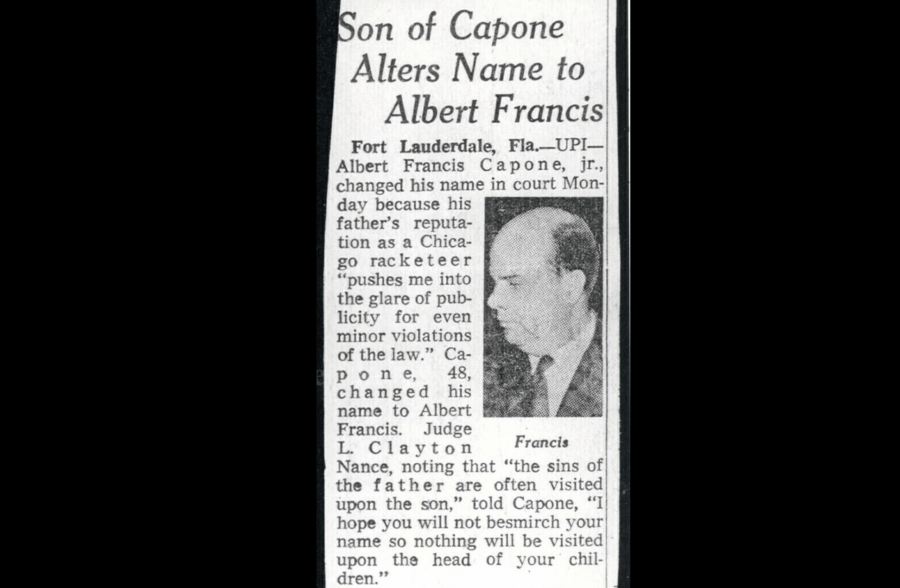Albert Francis Capone, the younger sibling of the notorious gangster Al Capone, carved out a distinct path that stands in stark contrast to his brother’s infamous legacy. His journey, marked by personal growth, ethical pursuits, and a commitment to family values, offers a compelling narrative of redemption and self-determination. This article delves into the life, achievements, and enduring legacy of Albert Francis Capone, exploring the complexities of his relationship with his family and the broader impact of his choices on society.
When the Capone name is mentioned, it often conjures images of crime and power. However, Albert Francis Capone’s story provides a fresh perspective, highlighting a life dedicated to legality, family values, and personal development. Unlike his brother, Albert chose a path that prioritized integrity and community engagement. His transformation from a young man overshadowed by his brother's notoriety to a respected community figure exemplifies resilience and adaptability.
This article aims to provide a comprehensive exploration of Albert Francis Capone’s life, achievements, and legacy. By examining his story, we can gain valuable insights into family dynamics, societal expectations, and the pursuit of redemption. Join us as we uncover the lesser-known chapters of Albert Francis Capone's journey and the profound impact he had on those around him.
Read also:Exploring The Evolving Role Of Divas In The Digital Entertainment Era
Table of Contents
- Biography of Albert Francis Capone
- Early Life and Family Background
- Career Path and Professional Achievements
- Relationship with Al Capone
- Personal Life and Family
- Legacy and Impact
- Public Perception and Media Representation
- Key Contributions to Society
- Legal Involvements and Controversies
- Conclusion
Biography of Albert Francis Capone
Born on December 2, 1906, in Brooklyn, New York, Albert Francis Capone, affectionately known as "Sonny" to his family, grew up in a household that would later become synonymous with organized crime. As the youngest of nine siblings, Albert navigated the complexities of his family’s reputation, forging a path that diverged significantly from that of his infamous brother, Al Capone. His life was marked by a desire to distance himself from the shadow cast by his brother’s criminal activities, while still maintaining a strong connection to his family roots.
Data and Biodata of Albert Francis Capone
| Full Name | Albert Francis Capone |
|---|---|
| Nickname | Sonny |
| Date of Birth | December 2, 1906 |
| Place of Birth | Brooklyn, New York |
| Parents | Gabriele Capone and Teresa Capone |
| Siblings | Alphonse Capone (Al Capone), Ralph Capone, Frank Capone, among others |
| Spouse | Marie Capone |
| Children | Two sons |
| Occupation | Vending machine business owner, author |
| Date of Death | November 21, 1980 |
Early Life and Family Background
Albert Francis Capone’s early years were deeply influenced by the vibrant Italian-American community in Brooklyn, where he was raised. Growing up in a close-knit family, Albert was exposed to the values of hard work, loyalty, and community support. However, the rise of his brother Al Capone to infamy brought both challenges and opportunities to Albert’s life. Despite the notoriety associated with the Capone name, Albert chose to focus on his education and personal growth, steering clear of the criminal activities that defined his brother’s career. This early decision to forge a different path laid the foundation for his future endeavors and set him apart from the family legacy.
Albert’s formative years were characterized by a strong sense of identity and purpose. He sought to build a life that aligned with his personal values, even as the public perception of his family name continued to evolve. His ability to maintain a low profile during this period demonstrated his resilience and determination to carve out his own identity.
Career Path and Professional Achievements
Albert Francis Capone’s career was defined by his commitment to legality, entrepreneurship, and ethical business practices. After completing his education, he ventured into the vending machine industry, establishing a successful business that spanned multiple states. His innovative strategies and dedication to ethical standards earned him respect and admiration within his community and beyond. Albert’s approach to business was not only about financial success but also about contributing positively to society.
Key Achievements in Business
- Established a thriving vending machine company that expanded across several states, showcasing his entrepreneurial spirit and business acumen.
- Developed and implemented ethical business practices that set a benchmark for others in the industry, ensuring long-term success and trust.
- Authored the book "Mob Boss," offering a candid and insightful account of his family’s history and his personal experiences, further cementing his legacy as a thoughtful and reflective individual.
Relationship with Al Capone
The relationship between Albert Francis Capone and his brother Al Capone was multifaceted and complex. While Albert admired Al’s charisma and leadership qualities, he was also acutely aware of the dangers and consequences of his brother’s involvement in organized crime. This awareness shaped Albert’s decision to pursue a career that emphasized legality and personal integrity. Despite their differing paths, the brothers maintained a close bond throughout their lives, with Albert often acting as a mediator in family matters.
Albert’s role in navigating the challenges posed by their family’s public profile demonstrated his ability to balance familial loyalty with personal principles. His efforts to support his brother while maintaining his own ethical standards exemplify the complexities of family dynamics and personal integrity.
Read also:Kyle Chandler Young A Rising Star In The Entertainment Industry
Personal Life and Family
Albert Francis Capone’s personal life was deeply rooted in his commitment to family and community. He married Marie Capone, with whom he had two sons, and dedicated himself to providing a stable and nurturing environment for his children. His efforts to shield his family from the notoriety surrounding the Capone name underscored his dedication to fostering a sense of normalcy and security.
Throughout his life, Albert prioritized maintaining strong family ties, fostering unity and support among his siblings and extended family. His commitment to family values and his role as a devoted husband and father are testaments to his character and resilience. His ability to balance personal and professional responsibilities while upholding his values is a source of inspiration for many.
Legacy and Impact
Albert Francis Capone’s legacy extends far beyond his business achievements and personal life. His story serves as a powerful example of transformation and redemption, offering valuable lessons about overcoming the challenges posed by family dynamics and societal expectations. By choosing a path that emphasized legality, ethical business practices, and personal integrity, Albert demonstrated the transformative power of resilience and determination.
His contributions to society, both through his business endeavors and his writings, have left a lasting impact on those who study the history of organized crime and its effects on families and communities. His book, "Mob Boss," remains a valuable resource for understanding the complexities of the Capone family’s history and its broader implications.
Public Perception and Media Representation
The public perception of Albert Francis Capone has evolved significantly over time. While his name has often been overshadowed by his brother’s notoriety, recent scholarship and media representations have begun to highlight the unique aspects of Albert’s life and legacy. Documentaries, articles, and books exploring his contributions to society and his efforts to distance himself from the criminal world have shed new light on his story.
Media Representations
- Documentaries that delve into the intricate dynamics of the Capone family, offering a nuanced perspective on Albert’s role and contributions.
- Books and articles that focus on Albert’s life and achievements, providing readers with a comprehensive understanding of his journey and impact.
- Interviews with family members and historians that offer fresh insights into Albert’s story, enriching the narrative of his life and legacy.
Key Contributions to Society
Albert Francis Capone’s contributions to society extend beyond his business achievements. Through his writings and public appearances, he sought to educate others about the realities of organized crime and its impact on families. His book, "Mob Boss," remains a valuable resource for those interested in understanding the complexities of the Capone family’s history and its broader implications.
His efforts to promote ethical business practices and personal integrity have inspired countless individuals to pursue paths that prioritize legality and moral responsibility. Albert’s legacy serves as a reminder of the power of transformation and the importance of staying true to one’s values, even in the face of adversity.
Legal Involvements and Controversies
Throughout his life, Albert Francis Capone maintained a clean legal record, distinguishing himself from the legal entanglements that plagued his brother. However, the Capone family name was often associated with controversy, requiring Albert to navigate public scrutiny with grace and resilience. His ability to uphold his integrity while living under the shadow of his brother’s notoriety is a testament to his character and determination.
This aspect of his life serves as a powerful example of how individuals can overcome the challenges posed by family legacies and societal expectations. Albert’s story offers valuable lessons about the importance of staying true to one’s values and principles, even in the most challenging circumstances.
Conclusion
In conclusion, the life and legacy of Albert Francis Capone offer profound insights into the complexities of family dynamics, societal expectations, and personal redemption. Through his commitment to legality, ethical business practices, and family values, Albert demonstrated the transformative power of resilience and determination. His story serves as an inspiration to those seeking to overcome the challenges posed by their family’s past and forge their own path in life.
We invite you to share your thoughts and reflections on Albert Francis Capone’s life and legacy in the comments section below. Additionally, we encourage you to explore other articles on our site that delve into the fascinating history of organized crime and its impact on society. Together, we can continue to learn from the past and build a brighter future for generations to come.


